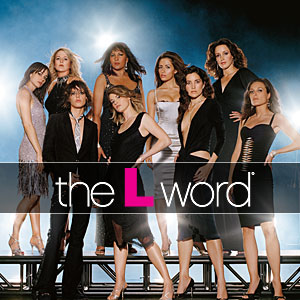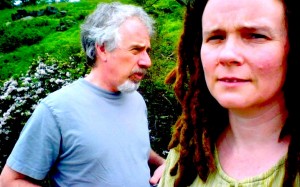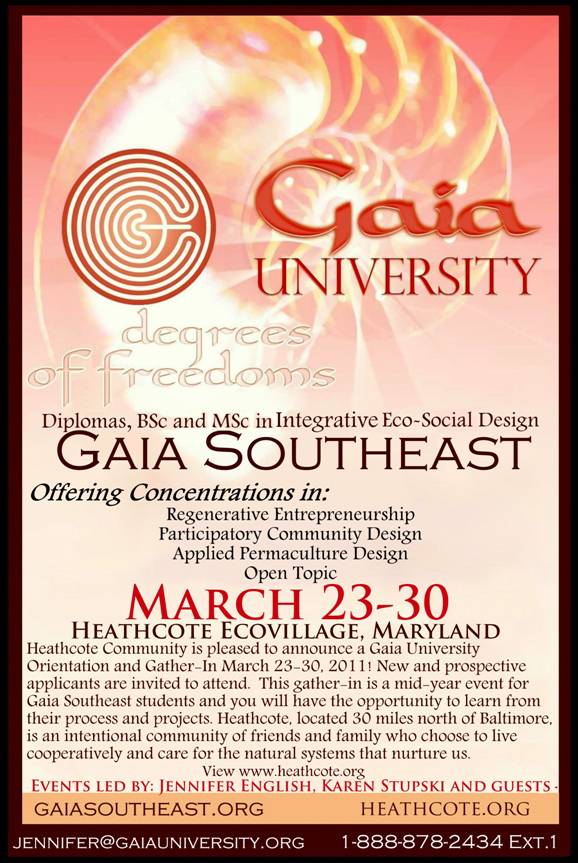If You Missed Saturday’s Gaia U Open House, Here’s Your Second Chance!
Come to our Gaia University Open House!
March 5, 2011, 7:30 – 9:00 PM at Heathcote Community
Come learn about Gaia University, an institution for higher learning with a unique approach. The students (called associates) are able to earn accredited Bachelors & Masters degrees and Graduate Diplomas whilst being actively engaged in self and planetary transformation and ecosocial regeneration. The Open House will provide an overview of Gaia University’s action learning methodology and our programs in Integrative EcoSocial Design with concentrations in Applied Permaculture Design, Regenerative Entrepreneurship, Participatory Community Design, and Open Topic.
Heathcote is partnering with Gaia Southeast to host a Gaia Gather-In March 23-30, 2011. Prospective applicants may attend the whole gathering or audit individual days. Find out more at the Open House!!
Please RSVP by Mar. 4 by calling 410-357-9523 or email education@heathcote.org.
From Wren: I attended last Saturday’s Gaia U Open House. I continue to be amazed at the scope and effectiveness of Gaia U. It brings our alternative values into practice, while educating alternative-minded students in hands-on, exploratory, real world ways. It’s a great alternative to the conventional classroom! I hope you can make this Open House or connect with Gaia U through its website or other means! —WT
Subscribe to this blog's RSS feed
A Global Open Space Geared Towards Action
From Wren: The World Social Forum is a growing event that happens concurrently with The World Economic Forum. WSF intends to turn the tide of “neo-liberal globalization,” (free market capitalism, with slavery, child labor, imperialism and environmental injustice).
I just received this email reporting on the World Social Forum in Dakar, Senegal. Click here for extensive photo coverage.
C.T. Butler and I had planned to attend it and the preceding IndyMedia Convergence as consensus trainers, but our invitation was relatively last minute and funding didn’t happen in the short time. We’re expecting our friends to return in the next few days with exciting stories! Until then I share this, unedited:
—WT
From Sven Giegold—
Just like last year’s World Social Forum held in Belem (Brazil), the
Forum in Dakar took place under the impression of the deep crisis of
neoliberal globalization. Whereas the economy has recovered for some
time already in some regions of the world, it started to do so recently
in others. But all that cannot hide the existence of deep social,
economic and ecological problems. The WSF provided a meeting point for
a broad range of individuals originating in movements and civil society
who hope to overcome neoliberal globalization: Either by establishing
social and ecological regulations, for instance by implementing a
“Green New Deal”, or by breaking with capitalism in general. This range
of political alternatives characterized this WSF, just as the
alterglobalist movement in general. In the run up to Dakar, Gustave
Massiah (2011a & 2011b)* wrote a widely acknowledged book and published
12 theses on the alterglobalist movement.
Whereas the debate in Belem had been dominated by discussions over the
crisis of civilization and fundamental alternatives to globalized
capitalism, such as the concept of “buen vivir” (“good living”) this
was different in Dakar. This year, the agenda was dominated by the
peaceful revolutions in Egypt and Tunisia, and the particular African
context with its own topics. Already the impressive opening march made
clear that this would not be a forum of big overarching claims and
slogans. The organization committee succeeded in mobilizing a big
variety of social- and grassroots-movements from all over West Africa.
Caravans had been travelling across all neighbour countries, converging
to Dakar from different directions. On the one hand they provided cheap
transportation, on the other hand they called attention to the WSF. And
they did not come with red, green or any other banners, but with their
own concerns: land grabbing in order to fulfill the needs of the global
consuming class in times of increasing scarcity of arable land.
Protection of local seeds and local production from control of
multinational companies and agricultural subsidies. Sea grabbing by
industrial fishing on the cost of family-run fisheries.
Especially the strong African women’s movements were eye-catching,
regarding land use rights, fisheries as well as participation of women
in conflict resolution on the African continent. Finally, fortress
Europe with its inhuman “frontier protection” regime, was a big issue.
Senegalese students and others confronted European participants over
and over again: How is it possible that you are able to come here
without a visa, whereas we do not even have a chance of having one?
Global freedom of movement, as being part of global civil rights, was
claimed consistently. A Migration Forum adopted a “Charta of Migrants”
in the run up to the Forum (http://fsm2011.org/fr/charte-mondiale-des-
migrants ).
In short: new and old forms of colonialism were the decisive topics of
the WSF. Fortunately, there was no arrogant western critique or bashing
of African grassroots movements this time, in contrast to the 2007 WSF
in Nairobi. This was partly favoured by the less obvious appearance of
religious groups – either Christian or Muslim -, so that religious
intolerance, popular in some left currents, was less provoked. However,
the engagement of Catholic and Protestant development organizations can
be seen as positive in enabling numerous of their partner organizations
from the global South to participate in the WSF. The “German Protestant
Development Service” presented its study on EU-West African fisheries
cooperation, which massively affects the right on food of local
fishermen and their families along the coast. Left parties and labour
unions were not as visible as at Forums in Latin America and 2003 in
Mumbai/India. The only German union participating in the WSF was the
GEW. Big NGOs were present numerously, but did still not dominate the
Forum. The participation of the global alterglobalist movement mirrored
its regional spread on different continents as well. Whereas Europeans
and Latin Americans were very visible, alongside the in numbers
dominating Africans, there was very few Asian participation apart from
India. North American NGOs were under-represented in terms of numbers
as well.
Unlike in Latin America, no African government relates politically to
the alterglobalist movement. The revolutions in Tunisia and Egypt
therefore became the point of reference concerning political power of
the Forum. A dozen of Social Forums held in the Maghreb region had
helped to prepare change. Nevertheless, it would be an exaggeration to
see the fall of the two antidemocratic regimes as a success of the
alterglobalist movement. But a lot of organizations associated with the
process of World Social Forum want to travel to Tunisia around the 20th
of March. The European network of Attac is preparing a delegation in
cooperation with Attac Tunisia.
The new methodology applied at WSF proved to be of value: One day of
events dealing with African topics was followed by two days of events
self-organized by participating organisations. Opening and final events
were the only big and centrally organized events. Just like in the
years before, there were numerous events dealing with the same topics
because the organizers did not know each other in advance.
During the last one and a half days, 38 action assemblies were taking
place. Each of them dealing with one relevant topic. They turned out to
be a big success throughout. Resolved common actions were frequently
based on preparatory work of global networks, that were initiated at
WSF some years ago. Those networks – often running a little secretary,
mailing lists and regular phone conferences – are one of the biggest
success of past World Social Forums. And one of the most overlooked
ones at the same time. The World Social Forum can therefore be seen as
a Global Open Space gearing towards action.
As there was no systematic documentation of the results of the 38
action assemblies, I will only mention some of the numerous results.
They are politically only binding the participants, not the World
Social Forum as a whole. During a big event with 300 participants
dealing with land grabbing, a whole clutch of activities was agreed
upon and a declaration was adopted
(http://farmlandgrab.org/post/view/18159 ).
In doing so, it became obvious that the fight of traditional land use
rights, and with it the right to food, have to be won on a local level.
Whereas consumerism of the global rich, interests of multinational
companies, and powerful states are the cause of land grabbing in the
global South, local authorities and nation states from the global South
play a decisive role as well. They should defend peasant’s rights
instead of serving export agriculture in an often corrupt manner.
This was also demonstrated during the conference “land and sea
grabbing” which was organised by our Green group in the European
Parliament and took place at the edge of WSF. We have to take advantage
of the relevance of the very topic at WSF in order to impose pressure
upon illegitimate practices of western companies and EU trade policy,
which negatively affects small producers in the Global South. At the
same time, we have to strengthen fair trade and social movements
putting pressure on their governments.
The mobilization agenda for the upcoming months became obvious
throughout different meetings. G8 and G20 summits are going to take
place in France this year. Sarkozy wants to present himself as an
alterglobalist, failing with his agenda because of “other evil states”.
At the same time he is slowing down EU regulation processes regarding
the financial markets and the introduction of a European financial
transaction tax. It seems to be clear that French movements will not
let pass this obvious cheap strategy. The action assembly dealing with
G8/G20 adopted a corresponding resolution (http://gruenlink.de/54 ). An
organization committee with networks all over Europe has been created
in France. A strong mobilization towards Deauville in March (21st-22nd)
and Cannes in autumn (31st October until 5th of November) can be
expected. And there will be another preparatory meeting, taking place
on the 26th and 27th of March in Paris. Withstanding strong existing
tensions between NGOs and social movements relating to the topic of
climate protection, seems to be possible.
Furthermore, a lot of movements are heading to South Africa where the
next World Climate Conference (COP-17) is going to take place from 28th
of November until 9th of December in Durban. Even more attention is
given to the Rio-+20-Earth Summit which is going to be held from 14th
until 16th of May 2012. Realisation of a “People’s summit” as parallel
event for civil society is planned in Rio. It is a politically
interesting coincidence that both conferences dealing with climate
protection and biodiversity are going to be held in booming countries.
Both governments emerged from social movements. At the same time they
did not cover themselves in glory regarding ecological policy. How to
fight against ecological and social crisis with a common economic
strategy is going to be the essential subject. All in all there will be
a chain of big mobilizations for the alterglobalist movement:
Deauville, Cannes, Durban, Rio.
Unfortunately, the Forum suffered a lot from organizational problems.
The presidency of the university had changed recently and the new
president did not see himself bound to former agreements. As a
consequence, the WSF had to be held in addition to the regular
university schedule, which led to double usages of rooms. It lasted
quite a long time until tents were built up. But even then, changes of
rooms were not announced sufficiently. As a result, many events, that
had been carefully planned in advance had to be cancelled. Small
organizations were affected in the first place.
Nevertheless, all those problems could still not destroy value and
success of the Forum. The International Council of the World Social
Forum, who met in the aftermath of the Forum, accordingly rated it as a
success. Globally successful networks and their activities demonstrate
the necessity and benefit of the WSF. Anyhow, the Forum is neither
running out of topics, nor repeating contents without progress, as
often claimed. World Social Forums are developing regionally as well as
thematically. Even if it is true that there is still no – and will not
be an – overarching, common theory of social movements and independent
civil society. The discourse of an alleged exhaustion is based on a
wrong desire of unity and one big, unifying “-ism”. But the lack of
such an ideology must not necessarily be seen as weakness – it rather
proves the democratic strength of the alterglobalist movement.
In the Council, it was rightly criticised that a state representative -
Bolivian President Evo Morales – was given the honour to open the
global Forum of civil society. This had not been agreed on with the
Council in advance. Furthermore, there are accusations that the
Moroccan and Algerian government co-financed the WSF in return for
political concession on the Western Sahara issue. These allegations
have to clarified fully. Finally, there were critical inquiries by
Indian and Brazilian participants regarding the process of European
Social Forum. As a matter of fact, the process of European Social Forum
is in trouble for years. In contrast to the World Social Forum, linking
up big NGOs, labour unions and radical social movements, failed so far.
Almost all big organisations have left the process, which is now led by
a small and insufficiently legitimised preparatory committee. It is a
good sign, that has now been noted and is criticized from the Global
South.
* Gustave Massiah (2011a): Une stratégie alterglobaliste, Paris: La
Découverte.
Gustave Massiah (2011b): Les douze hypothèses d?une stratégie
alterglobaliste, http://www.cetri.be/spip.php?article2060&lang=fr
You can find my 150 pictures taken at World Social Forum here.
———————————————
Sven Giegold, MdEP
http://www.sven-giegold.de * facebook/twitter: sven_giegold
__________
Please join our Hippie Chick Diaries fan page on Facebook!
Too Busy for The L-Word
 One thing that is the same at Heathcote, my Intentional Community, as in the wider world is our tendency to over-schedule and over-commit.
One thing that is the same at Heathcote, my Intentional Community, as in the wider world is our tendency to over-schedule and over-commit.
It’s a predictable comedy when we whip out our calendars at meetings and try to find a date for any outing, celebration or committee work. We’re certain to settle on some compromise date that leaves some people falling off the edges, “I can’t be there, but you all have it without me…”
Even as I shift my own projects, saying good bye to Open Classroom and selling off our fair trade retail venture Heathcote Earthings, my freed-up weekends have somehow gotten scheduled.
Nature abhors that vacuum; Wherever it appears, here comes stuff flying in!
Last summer, I kept the Communities Conference at Twin Oaks on my calendar for months. Finally I would get to go, represent Heathcote, market ZEGG Forum to Communities, network, play, eat, etc.
But wait! Along came Mother Earth Harvest Fair, holding an organizing meeting on the same weekend, conflicting with a great gathering at which I could have marketed…Mother Earth Harvest Fair.
Notice the subtle difference in saying, “This is when the meeting is,” versus, “When can you meet?” In either case, I expect you’ll have people dropped off the edges. But if I’m invited to find a date that works for me and that becomes difficult, I can opt to serve the higher good with my, “You all meet without me.” If I’m informed of a date and I have a conflict, I’m faced with breaking one commitment or the other. It’s a subtlety of inclusion and empowerment, I know.
So…I had low expectations when I opened my Netflix in the Heathcote kitchen and announced to the random Heathcoters within earshot, “Hey, I have season one of The L-Word! Who wants to watch?” Karen, my sister in queerness, zoomed up to answer me. “I’ve always wanted to watch that but I haven’t gotten around to it!”
That was the case with me, as well. Two over-scheduled gurrls, living in the woods who haven’t gotten around to checking out the now-canceled L-Word since it first aired in 2004…Ah…Sad.
“Can you watch it tonight?” I cringed, not daring to hope. I could see this collaboration log jamming my Netflix queue for the next month.
“Well, I have one thing I really have to do, but after that, maybe eight o’clock?”
What just happened? Did she say tonight?
She was clearly trying to calm the series of faces I was making, but I took the offer. And it only took until half way through dinner for Karen to warn me of her second thoughts. “I’m really feeling tired,” And, on schedule, half way through dinner cleanup she recanted, “I really want to see it but I know I’m not going to make it through. I’m just wiped out…”

You can put the tea in Ellie, my favorite mug. It has a band of runes that spell the four elements. I don't see that on The L-Word...
Watching on my own, I found out this land dyke wasn’t missing anything. I bailed after three episodes; I just wasn’t hooked. I can’t relate to rich lipstick sisters and their suburban problems. I’m still hoping for some Princess Charming who doesn’t know she has motor oil behind her ear (so cute) to saunter over here and haul this goat chow up the hill, and then make me some ginger nettle tea and massage my aching joints…between her many committee meetings.
Please join our Hippie Chick Diaries fan page on Facebook!
Community Plus Partner: Integrating Significant Others
 Relationships, polyamorous or monogamous, are complicated enough. Imagine if all your friends had to reach consensus on whether you and your sweetie(s) could move in together. Well, actually, your friends might relish that power. Anyway, welcome to the alien terrain in which my partner and I find ourselves. I live at Heathcote Community and in order for my partner to share my home, he has to apply and be accepted as a member of the Community, a process that can take eight months or more to be finalized.
Relationships, polyamorous or monogamous, are complicated enough. Imagine if all your friends had to reach consensus on whether you and your sweetie(s) could move in together. Well, actually, your friends might relish that power. Anyway, welcome to the alien terrain in which my partner and I find ourselves. I live at Heathcote Community and in order for my partner to share my home, he has to apply and be accepted as a member of the Community, a process that can take eight months or more to be finalized.
Even though Heathcote is a mixture of couples and singles, this is not an issue we’ve often faced, considering a membership application from an existing member’s lover. It’s a very different dynamic than welcoming a couple together or an individual. What happens if someone doesn’t like this new partner?
In our tried and true process, we invite an applicant to visit for 21 days, either consecutively or over time. We get acquainted and discuss the Community’s values, systems, etc. Either the applicant or a Heathcoter can decide at any time that things don’t seem to be a match. But if all seems cozy, we approve the applicant to move in and begin a seven month provisional membership period.
But what if there is an issue, and it’s a community member’s lover? The stakes get much higher. If the Community rejects this applicant, they stand a good chance of losing an existing member, too. Will people feel pressured, in that case, to ignore problems?
 My partner, C.T., has unique worries. He’s a consensus trainer and writer. Will Community members feel self conscious practicing consensus around him, or will they be resistant to his thoughts on our process, assuming that he expects us to do things his way? How to tread lightly and lovingly when you’re something of a big wig in your field…
My partner, C.T., has unique worries. He’s a consensus trainer and writer. Will Community members feel self conscious practicing consensus around him, or will they be resistant to his thoughts on our process, assuming that he expects us to do things his way? How to tread lightly and lovingly when you’re something of a big wig in your field…
Mostly things are smooth sailing so far. But I know everyone’s aware of the new dynamic. We did dance here briefly before when a former partner of mine applied. That was quite a minefield, as that partner truly wasn’t a fit for Heathcote, despite being likable on many levels.
Now C.T. and I aren’t the only ones. Nick’s partner Rachel has applied for membership. Previously, I experienced that moving to a small, rural Community as a single person was a decision to remain single. It seemed very hard to make, maintain and grow connections.
Did something shift? Has the internet negated that isolation? I have had good luck with GreenSingles… Whatever the case, along with the singles and couples interested in Heathcote, we also have partners coming to roost!
—WT
Please join our Hippie Chick Diaries fan page on Facebook!
Gaia University Open House: Feb. 19, 2011, 1-3 PM at Heathcote Community
Come to our Gaia University’s Open House!
Feb. 19, 2011, 1-3 PM at Heathcote Community
Learn about Gaia University, an institution for higher learning with a unique approach. The students (called associates) are able to earn accredited Bachelors & Masters degrees and Graduate Diplomas whilst being actively engaged in self and planetary transformation and ecosocial regeneration. The Open House will provide an overview of Gaia University’s action learning methodology and our programs in Integrative EcoSocial Design and Open Topic. Heathcote is partnering with Gaia Southeast to host a Gaia Gather-In March 23-30, 2011.
Please RSVP by Feb. 16 by calling 410-357-9523
or email education@heathcote.org
Note from Wren: Karen Stupski and I attended some of the first organizational gatherings of Gaia University at The Farm in Tennessee several years ago. I was electrified at the bold notion that our alternative culture could create higher education models that reflect our values and priorities. This is where I first encountered Spiral Dynamics and Action Learning. Gaia U founders Liora Adler and Andy Langford brought a clarity of vision that has propelled ideas into the realities of several learning pathways.
It’s been exciting to watch this university without walls attract more and more students and more sites each year. Whether or not you are planning to enroll, consider this Open House as a way to learn about alternatives you can promote to the next generation, or even people seeking a career change. Imagine majoring in Permaculture or Facilitation instead of Business…—WT
Please join our Hippie Chick Diaries fan page on Facebook!

